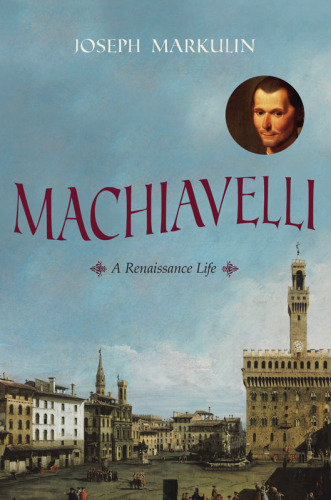
Machiavelli
A Renaissance Life
کتاب های مرتبط
- اطلاعات
- نقد و بررسی
- دیدگاه کاربران
نقد و بررسی

October 15, 2013
A bland "nonfiction novel" about the life of the civil servant who lent his name as a byword for self-serving machination. The notion of a nonfiction novel owes much to Truman Capote, whose In Cold Blood was so branded owing to a few gaps that he guessed at in the exchanges between major characters. In the case of the 15th-century Florentine Machiavelli, there are scarcely more than gaps: some surviving letters, testimonials from contemporaries and, of course, Machiavelli's own writings, most famously The Prince. Why Markulin chose to cast Machiavelli's life in the form of fictive back and forth is anyone's guess, but the dialogue is quite staggeringly uninteresting and quite Middle American: " 'Do you think he's guilty, Pagolo?' said Rinuccio. 'Guilty? Hell, yes! Guilty of being a goddamn public nuisance.' " Machiavelli himself has all the narrative zing of a grocery clerk in Piscataway, though Markulin correctly portrays him as a man smart enough to be able to read the political winds and adapt accordingly in a time when Italy's powerful families--Medicis, Sforzas and so on--were falling upon and hacking each other up with wild abandon: Old Niccolo was the original survivor, if not the comeback kid. There are a couple of nice and defensible turns, such as Machiavelli's run-ins with a very stern, very bad local archbishop whose behavior taught him a thing or two about power and its application. And Markulin does get most of the historic details correct (notably the bad smell of medieval streets, to which he often returns), but what is actual history in these overabundant pages is textbook-ish and didactic. The overall effort is a ham-fisted blend of historical novel, with none of the grace of a Mary Renault or Robert Graves, with documentary script for some lesser version of the History Channel, one that allows for plenty of smelling--and bad aromas. Inferior (save invented dialogue) to Miles Unger's Machiavelli: A Biography (2011) and Corrado Vivanti's Niccolo Machiavelli: An Intellectual Biography (2013).
COPYRIGHT(2013) Kirkus Reviews, ALL RIGHTS RESERVED.

August 1, 2013
Niccol Machiavelli, best known as the author of the political tract The Prince, is often cited as the proponent of cynical, manipulative, and ruthless exercise of political power. Of course, in reality, both the man and his ideas are more nuanced. Markulin, a former professor specializing in Renaissance studies, has written a so-called nonfiction novel that makes a clumsy but often enjoyable effort to examine the man and his time. Markulin captures the cultural dynamics as well as the chaos, treachery, and violence that characterized political life in fifteenth-century Italy. He also offers interesting, if not necessarily accurate, portraits of members of the Medici and Borgia families and mixes in juicy tidbits of sex and moral chicanery. Machiavelli is painted as a rather heroic and even tragic figure, and Markulin probably has inflated both his power and importance in his own time. This is not serious history, but it is an enjoyable romp through a fascinating period in European history.(Reprinted with permission of Booklist, copyright 2013, American Library Association.)

























دیدگاه کاربران